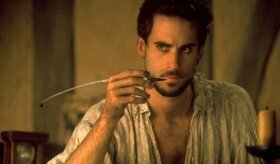|
|
| Tookey's Review |
|
| Pro Reviews |
|
| Mixed Reviews |
|
| Anti Reviews |
|
| Cast |
|
| |
 |
| |
| Released: |
1998 |
| |
|
| Genre: |
ROMANCE
COSTUME
COMEDY
|
| |
|
| Origin: |
US |
| |
|
| Colour: |
C |
| |
|
| Length: |
120 |
|
| |
|
| |
|
|
| |
|
|
William Shakespeare (Joseph Fiennes), a young playwright and occasional actor with a failed marriage behind him and a bad case of writer's block on his latest effort, a comedy provisionally entitled Romeo and Ethel, the Pirate's Daughter, is wooed for the manuscript by two rival theatre managers, Burbage (Martin Clunes) and Henslowe (Geoffrey Rush) but unable to deliver. He is angry at the way the actors mangle his lines - Will Kempe (Patrick Barlow) even has the temerity to turn his Two Gentlemen of Verona into a dog act. Most of all, Shakespeare is jealous that everyone thinks more highly of the handsome and talented playwright Kit Marlowe (Rupert Everett) than they do of him. No sooner does Will enter a boat than the ferryman, the 16th century equivalent of a cabbie, is informing him tactlessly "I had that Christopher Marlowe in my boat once". Will needs a muse, and along she comes in the shape of a rich merchant's daughter called Olivia (Gwyneth Paltrow) who has acting ambitions, even though acting is a man's profession and her parents wish her to wed the dashing but awful Duke of Wessex (Colin Firth). Olivia infiltrates Shakespeare's company in drag, Will and she fall in love, and she becomes his inspiration; but their love is not to be, since the establishment, personified by Dame Judi Dench as Queen Elizabeth I, decrees otherwise.
|
Reviewed by Chris Tookey
|
|
How weary, stale, flat and unprofitable will seem so many films, after you have witnessed Shakespeare in Love: an Anglo-American romantic comedy that is in love with words, theatre, Shakespeare - and the pain and pleasure of overwhelming love. Director John Madden's follow-up to Mrs Brown is a far more lavish affair, and infinitely more cinematic. It is blessed with a marvellous screenplay by Tom Stoppard and Marc Norman - well-structured, witty and wise. Running throughout is a profound love of theatre and a huge though far from uncritical affection for actors. Even the moneyman who is suing Henslowe for debts (played by Tom Wilkinson) becomes stagestruck and is roped in to play the apothecary in Will's new production.
Personifying this very commercially-minded theatre is Henslowe, a wily, incorrigibly optimistic impresario miraculously played by the great Geoffrey Rush as a cross between Arthur Daley and Bill Kenwright.
"Let me explain about the theatrical business," he tells Wilkinson with glee. "The natural condition is one of insurmountable obstacles on the road to imminent disaster." "So how does it end well?" he is asked. "I don't know," he shrugs, "it's all a mystery".
Even Henslowe's optimism is shaken as Olivia's muse turns piratical comedy into a commercially dodgy tragedy.
"Well," says Henslowe sarcastically as Shakespeare recounts the double-suicide ending, "that will have them rolling in the aisles."
The two central jokes of the film, reworked ingeniously numerous times to wonderful effect, are that writers turn their personal experiences into fiction, but not in predictable ways, and that show business is pretty much the same through the ages.
"Who's that?" Wilkinson asks about Shakespeare, as he passes.
"Nobody," says the impresario. "He's the author."
Another thespian (Jim Carter) who plays the nurse is asked what Romeo and Juliet is about. "Well," he starts off, "there's this nurse…"
It will come as no surprise after Emma and Sliding Doors that Gwyneth Paltrow speaks with an impeccable English accent and is radiantly beautiful in a way reminiscent of Audrey Hepburn.
Less predictably, her fellow-American Ben Affleck turns in an effective performance as Henslowe's leading actor, whom Shakespeare attempts to placate with the role of Mercutio, having given the role of Romeo to Paltrow.
The film starts as a romp and continues in great good humour and with oodles of charm; but there are moments of pathos and depth, superbly played by Fiennes and Paltrow. Rush gives one of the scene-stealing performances of all time. Judi Dench, in three brief scenes, gives another.
Her exit line - "Too late" as various courtiers cast their cloaks on a puddle through which she has just splashed - gets the biggest laugh, and she conveys a lifetime of being Elizabeth in fewer than ten minutes of screen time.
A passing knowledge of Romeo and Juliet will help your appreciation, and there are allusions to Macbeth, Twelfth Night and several other plays; but the screenplay wears its learning lightly. It would be hugely enjoyable if you were coming to Shakespeare's writing for the first time.
Special praise is owed to Sandy Powell's costume designs, but this film is not content to be easy on the eye. It pulsates with energy. Shakespeare in Love begins as a bawdy romp in the tradition of Dick Lester's The Three Musketeers; but it deepens into a touching love story. It isn't quite like any other film. There have been few more affecting romances on screen in recent years. This is a classic romantic comedy.
|
|
|
|
|
